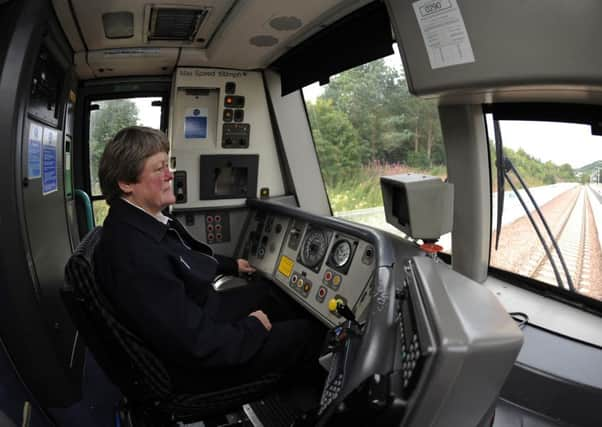Rail staff threaten action over plan to downgrade conductors


Workers at several depots across the Central Belt are understood to be discussing an unofficial overtime ban in protest at the plans, which could lead to trains being cancelled.
A leaked document passed to Scotland on Sunday sets out plans for drivers to take over the safety role of opening and closing of train doors from conductors, who would be left to check tickets.
Advertisement
Hide AdAdvertisement
Hide AdIt also proposes that lower-paid ticket examiners could replace conductors on some services.
The door-control change, called driver-controlled operation (DCO), would be introduced when a fleet of 70 Hitachi-built trains start running next year, replacing older carriages.
The routes to be affected by the proposals will be Edinburgh-North Berwick, Glasgow/Edinburgh-Dunblane, Glasgow-Alloa, Glasgow-Cumbernauld-Falkirk Grahamston, and a secondary Edinburgh-Glasgow line via Shotts.
The only route to be served by the new trains on which conductors will retain their current role is the main Edinburgh-Glasgow line, via Falkirk High.
The document said this was “to reflect the importance of the customer experience” because the route has first-class seating unlike the others.
However, it said the Scottish Government’s Transport Scotland agency “required the new electric services to be operated at the lowest possible cost to the taxpayer”.
It stated: “ScotRail propose conductors undertake commercial duties on these routes.”
It also proposed that ticket examiners could be drafted in for this instead, and more of them will be recruited.
Advertisement
Hide AdAdvertisement
Hide AdElectric trains around Glasgow have been operated solely by drivers for 30 years, which is known as driver-only operation (DOO). Ticket examiners check fares on such trains.
Extension of the practice on a new Edinburgh-Glasgow line via Bathgate in 2010 triggered a series of strikes.
However, the unions reluctantly accepted the change by acknowledging the system had previously operated on part of the route.
However, the Rail, Maritime and Transport (RMT) union, which represents conductors, said any move by ScotRail to implement the latest proposals would trigger a ballot for industrial action.
Scotland secretary Mick Hogg said: “We will not accept anything that proposes removing the guard [conductor] from the train.
“This also includes any attempts to water down the safety role and responsibility of the guard. There will be no further extension of driver-only operation or driver-controlled operation under any circumstances.
“This campaign is not about money, but purely about health and safety – keeping our trains safe and keeping members of the public safe.”
Aslef, the main drivers’ union, also expressed opposition.
Scotland district secretary Kevin Lindsay said: “I’m not aware of these proposals and we’ve had no talks on this.
Advertisement
Hide AdAdvertisement
Hide Ad“But Aslef’s policy remains that we don’t support any further extension of DOO or DCO. We will not accept any further expansion.”
The RMT declined to comment on talk of unofficial action at depots, thought to be Glasgow Central and Queen Street, Edinburgh and Stirling.
However, one conductor said: “Staff are very downhearted and feel let down by the company. There is a lot of resentment.”
Unofficial action by ScotRail drivers last year in protest at continually being asked to work overtime forced the cancellation of hundreds of trains.
The ScotRail Alliance, which includes track owner Network Rail, said the proposals were to coincide with the new trains. Its spokeswoman said: “As part of this introduction, we want to discuss and consult with our people about making some changes to the way we work, so we can deliver the very best, safest service to our customers. These changes would mean we would retain two members of staff on trains – over and above any catering staff. We would protect staff terms and conditions and we would stick to our no-compulsory redundancy agreement.
“Our number one priority is always customer and staff safety, which is why we would never bring forward any proposals that have any impact on our strict safety regulations.”
The alliance said it was also seeking to incorporate Sundays, which are currently covered by staff working overtime, into the working week.
The spokeswoman said: “We want to grow the number of people who use Scotland’s railway. That is why we are keen to speak to our people about having Sunday as part of the working week. It will mean more opportunities for people to work on the railway.”